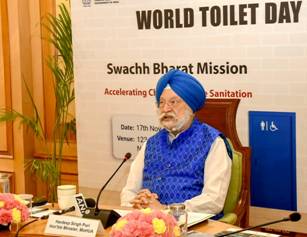New Delhi, 17th November:“No initiative encapsulates the growth of India as well as the Swachhata movement. Only 37% of India was Open Defecation Free (ODF) in 2014. By 2019, we had achieved near saturation through a record construction of toilets”, said Shri Hardeep Singh Puri, Minister of Housing & Urban Affairs and Petroleum & Natural Gas. He was speaking at an event organised by Ministry of Housing & Urban Affairs (MoHUA) to celebrate ‘World Toilet Day’. Shri Manoj Joshi, Secretary, MoHUA, Prof. Dr. Jack Sim, Founder, World Toilet Organisation, Ms. Veena Reddy, Mission Director, USAID, representatives from Sulabh International, HUL, UNICEF, BMGF, ISC-FICCI, and senior officials from Government attended the event.

World Toilet Day, celebrated on 19th November every year, aims to help break taboos around toilets and make sanitation for all a global development priority. This day is significant for India as the toilets were the centre piece of India’s Swachhata movement that addressed myriad sanitation and hygiene concerns.
Referring to the increased focus of Government on sanitation since 2014, the Minister recalled the launch of the world’s largest sanitation initiative – Swachh Bharat Mission by the Prime Minister of India to achieve an Open Defecation Free India by October 2, 2019, as a tribute to Mahatma Gandhi.
Speaking about the transformation of sanitation landscape in urban India through Swachh Bharat Mission, Shri Puri noted the unprecedented rate of toilet construction under the Mission that have helped in achieving the audacious goal of ODF urban areas.

Shri Puri said that the SBM-U stands as the largest behaviour change programme. It has become a Jan Andolan, and has received unprecedented public participation, he asserted.
The Minister spoke about how the mission has brought a positive change in lives of women, girls and the sanitation workers. The mission has promoted women-friendly toilets, formalised casual workers, and encouraged women-led enterprises in sanitation leading to empowerment of women and girls, he said. He also noted the focus brought by SBM on safety and dignity of sanitation workers.
The Housing & Urban Affairs Minister, acknowledged the need of scaling up of the work being done under the sanitation sector in India. He said, we want more and more civil society and NGOs to join us in our efforts to scale up this sanitation drive. The Minister also highlighted the importance of private sector in taking this movement to the next level.
Addressing the gathering, Shri Puri emphasized that the sanitation and cleanliness is an area where you can touch the lives of people and impact will be really satisfying.
Speaking at the occasion, Secretary, MoHUA, Shri Manoj Joshi said, “Removing garbage dumpsite in next few years will be the highlight. It’s time for us to move to another level where people can see the impact easily. In wash sector, a lot needs to be done. We need to focus more on aspirational toilets and we need involvement of private sectors and NGOs for that.”

Prof Dr. Jack Sim, Founder & Director World Toilet Organization shared the global experience of managing public toilets and basic issue involved in public toilets and summarised it through ABC: Architecture, Behavior, Cleaning. Speaking at the forum he said, “If everybody demands for clean toilet the owner of the toilets will have to live up to the expectation of the people so. Hence, the behaviour change is the focus.”
The event witnessed the launch of a 5-week Clean Toilets Challenge from 19th November, World Toilet Day to 25th December, Good Governance Day. The initiative is conceptualized in line with the World Toilet Day 2023 theme of “Accelerating Change for Safe Sanitation”. This first-of-its-kind nomination-based toilet challenge, aims to ensure functionality and sustainability of CT/PTs, with an objective to improve the operations and maintenance of toilets in urban India through a 5-week long mass cleanliness and maintenance drive across all toilets. The outcome is aimed at focusing on functional, accessible, clean, eco-friendly and safe for all SBM Toilets.
The Clean Toilets Challenge also aims to recognize model public toilets that exemplify cleanliness, accessibility, innovation in design, as well as functionality. The ULBs, parastatal bodies, private organizations can nominate their best model CT/PTs. Each applicant can nominate only 1 toilet model. The best performing toilets with unique O&M models can be nominated from the 1st till 10th Dec., 2023. The nomination form will be live on the MyGov portal 1st December onwards. The best model toilets selected by MoHUA through this challenge will receive national recognition and will also be featured in a publication to be released early in 2024.
To address the complex challenges of urban sanitation, MoHUA also launched the Partners Forum for SBM-U 2.0. The forum envisions partnerships beyond Development Partners and Sector Partners, to Corporates, PSUs, Line Ministries/Departments associated with WASH sector, International Funding Institutions etc. The Partners Forum has been launched with potential areas of collaboration including waste management infrastructure and services, O&M models, communication and outreach, technology, IT-enablement and Knowledge Management, Capacity Building, IEC/BCC, research and studies etc.
The event saw Insightful discussions on many interesting topics centered around the safe sanitation. During the event, NBCC showcased designs for new aspirational toilets through an audio visual, marking a shift towards smart, clean public facilities. The various development partners and corporates from India Sanitation Coalition, Hindustan Unilever Limited, Sulabh International, GlWA, private entities, academic and R&D institutions etc. shared their experiences of the journey in sanitation and Community Toilets/ Public Toilets. The event saw over 1000 participants from various sector partners, development partners, State and city officials & corporates.

Comments are closed.